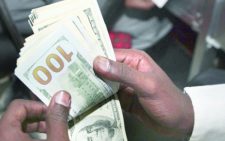Kenya’s forex reserves swell to record Ksh14.48B in July

Kenya’s foreign exchange reserves continue to be on the upward trajectory despite geopolitical tensions, showing optimism since the second quarter of 2025, further cushioning the shilling against fluctuations.
During the week ending July 10, 2025, Kenya’s foreign exchange reserves recorded a notable performance, increasing by $112 million (Ksh14.48 billion) to reach $11.201 billion (Ksh1.445 trillion) from the previous week’s $11.091 billion (Ksh1.430 trillion).
This, as per the Central Bank of Kenya (CBK) weekly bulletin, is equivalent to 4.9 months of import cover, up from the previous 4.8 months of import cover last recorded in June 19, maintaining the highest level recorded this year and well above the CBK’s anchor months of four.
“The usable foreign exchange reserves remained adequate at $ 11,201 million (4.9 months of import cover) as of July 10. This meets the CBK’s statutory requirement to endeavour to maintain at least 4 months of import cover,” the bulletin reads in part.
Since May, the second month of the second quarter, the reserves have increased by $1.037 billion (Ksh133.7 billion) in a period of eight weeks.
The economic significance of having a strong FX reserve is that it makes the Kenyan Shilling more competitive against major currencies such as the US dollar, the Euro and the Sterling pound.
As of July 10, 2025, the Kenyan Shilling traded at Ksh129.24 against the US dollar, Ksh151.77 against the Euro and Ksh175.96 against the Sterling pound.
“The Kenya Shilling remained stable against major international and regional currencies during the week ending July 10. It exchanged at Ksh129.24 per US dollar on July 10, the same as that on July 3,” the apex bank’s bulletin highlights.
Speaking to the Business Hub, Alexander Riithi, an economist from The Institute of Social Accountability (TISA) noted that the recent upwards trajectory in foreign exchange reserves and the stability of the shilling has largely been fuelled by the diaspora remittances and dollar inflows from the export of key agricultural commodities such as tea and coffee.
Positive performances
“If you look at the trend, we have continued to record positive performances in terms of the dollar inflows, both from diaspora remittances and select exports such as tea and coffee within the sector, even though our exports have been declining,” he explained.
He noted that previously, the rate was also fueled by the disbursements from both the International Monetary Fund (IMF) and the World Bank.
Riithi also pointed out that as a result, Kenyan exports become competitive due to affordability.
“In the export markets, when the dollar is at this rate, consumers are able to purchase these products, meaning compared to when the shilling is too strong.”
Diaspora remittances as per the bulletin reached $ 423 million (Ksh54.5 billion) in June 2025 from $372 million (Ksh47.98 billion) in June 2024, an increase of 13.8 per cent.
“The steady growth in remittance inflows remains a key source of foreign exchange earnings and continues to support the balance of payments,” the bulletin reads.
However, concerns have been raised over the nearly a year value stability while other major currencies continue to appreciate, with some stakeholders speculating that the state could be managing the shilling value.
Buying dollars
At a previous engagement, Chris Kiptoo, National Treasury Principal Secretary, defended the satiability, arguing that in fact the Kenyan shilling would have been much stronger at about Ksh100 against the dollar, but the CBK has been buying dollars to stabilise the shilling at Ksh129.
“With the reforms by the central bank, the shilling is stable. In January last year, the shilling was weakening, and I remember people were forecasting it to be Ksh250 against the dollar, but that changed due to the action to go back to the market in February, and since then the shilling has appreciated, gaining its stability,” he said.
“In fact, CBK has been buying dollars over the last year, you can imagine if it wasn’t buying, the shilling would have been much stronger, even perhaps at around Ksh100 per dollar,” he explained.
The strengthening of the shilling, much as it would mean cheap imports, economists such as Kwame Owino, the CEO of the Institute of Economic Affairs, caution that it would, on the other hand, affect the export markets and the tourism industry would become too expensive for foreign buyers and tourists, respectively.
“If you look the Kenyan shilling in the last eight to nine months, it has stabilised at Ksh129 because in that same time, the US dollar has appreciated against other currencies and that means that shilling has appreciated by another 10 per cent, in fact too strong for export competitiveness to happen and for tourism too,” he explained.













